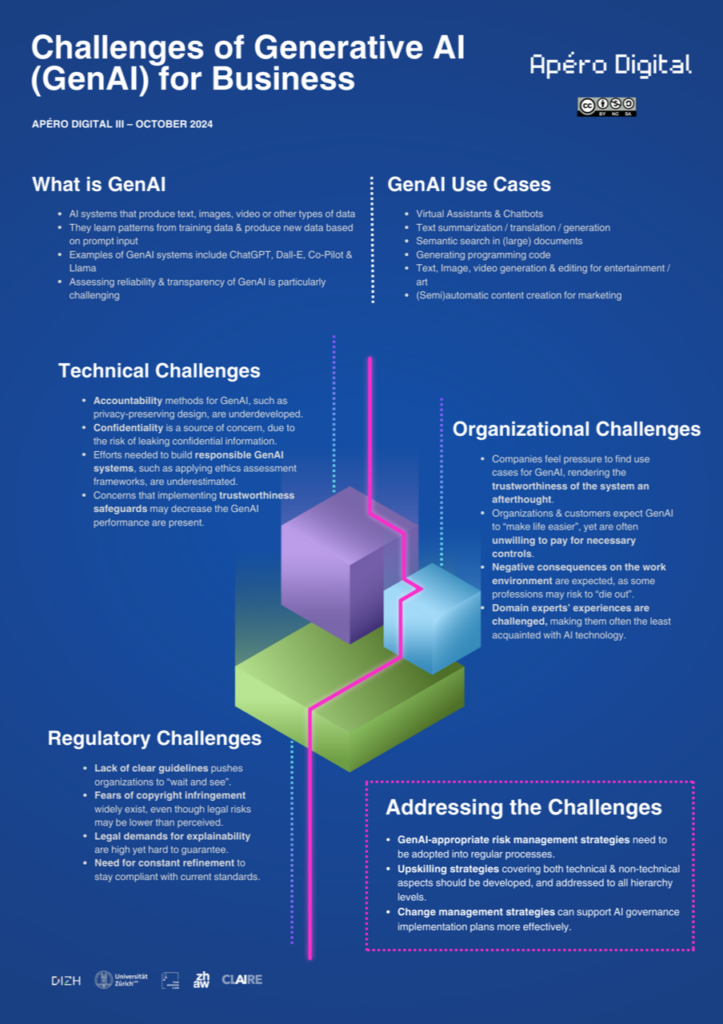What are the benefits and threats of generative AI for business use cases? Representatives of companies like Accenture, Wirz Group, and Voicetechhub came together with researchers from the ZHAW and University of Zurich to discuss current practices and issues such as copyright law, explainability of AI models and AI literacy.
Author: Johanna Seiwald, ZHAW
The quest for AI is not new, stated Abraham Bernstein from the University of Zurich. He referred to Mary Shelley’s novel Frankenstein, where Frankenstein’s goal is to create an intelligent being out of inanimate parts. While AI itself is not intelligent or monstrous per se, how we use it can be smart or result in irresponsible outcomes.
In the third session of Apéro Digital, an event series funded by the DIZH, multiple stakeholders discussed how the innovation community can best use generative AI tools. “With these events, we aim to facilitate discussions about human-centered technology and value-based innovation, as well as provide a bridge-building opportunity to connect dots among network partners over the apéro at the end of the events”, say researchers and organisers Ning Wang (UZH) and Ricardo Chavarriaga (ZHAW).
Where Generative AI Shines
Livio Dainese, Co-CEO and Co-Owner, Wirz group, presented a creative use case where the agency created a commercial with football manager Jürgen Klopp – or rather, with his face. They used body doubles, and Klopp only had to come to the studio for a face scan. Then, an AI was trained with the data. The technology allows them to generate multiple versions of the main protagonist, and he does not have to be present for time-intensive shootings. This new possibility allows everyone to become an actor. However, the process is still time-intensive, and outside of marketing-companies, the technology can be used for non-consensual deep-fakes.
In addition to creative processes, use cases that can make an impact are related to the implementation of AI on an organisational level and the digital transformation of the company. Max Gerling, Strategy Manager from Accenture, said that AI can enable key value pillars such as domain knowledge, digital upskilling of employees, innovation, and scaled origination. Nina Habicht, Startup Advisor and Investor from Voicetechhub, showcased a pilot that generates possible project outcomes within a sustainable development framework.
The Dark Side of AI
There are considerable challenges for companies that are related to time, money, data, strategy, regulation, and ethics. It is impossible to keep up with the plethora of AI tools and implement the right tool quickly. There is also the expectation that everything becomes more efficient, for example, marketing agencies that can generate output like movies more quickly. In reality, this is not the case, as a lot has to be edited manually.
Generative AI challenges all dimensions of today’s data strategy and how to bring existing tools together. The data foundation of a model has to be considered and possibly created/improved for specific company use cases. When data origin is not clear, this has real-world implications for big brands. Clients are then reluctant to allow the use of AI, fearing that it infringes copyright. There is also an ethical implication: illustrators are let go as AI can do part of their job – but the AI might be trained on the illustrator’s material without them being compensated.
Another issue with AI tools is that some of them are situated overseas and train their model with the input of the user. What if the agency promotes something that is not publicly disclosed yet? Companies have to consider carefully which data they put into which model. Lastly, with generative AI it is often difficult to understand how the algorithm arrived at a particular decision or outcome and it could be an outright lie.
Best Practices and an Artefact for You
The experts at the event shared their advice and best practices with the attendees:
- Start small and lean: Begin with small-scale projects to test the waters and refine your approach. Some use cases are not obvious and less risky than others.
- Be open to failure: Gen AI is still a developing field, and failures are inevitable. Be prepared to learn from them and adapt.
- Develop safe models: Create models that prioritise confidentiality, data protection, and transparency.
- Upskill your team: Invest in digital literacy trainings to ensure the teams can effectively and responsibly use and manage Gen AI tools.
- Establish clear guidelines: Develop clear guidelines or recommendations for the use of generative AI within your organisation.
- Keep up-to-date with the AI governance landscape: It is being constructed as we speak, for example, with the EU AI Act and the AI literacy requirements for companies (Article 4, implementation in February 2025).
In the workshop, attendees formed three groups and discussed the use of generative AI from different perspectives. The event resulted in a tangible artefact, co-produced by all participants:

The article was published wurde am 30.12.24 auf dem ZHAW Blog Digital Futures Lab veröffentlicht.
Die Autorin Johanna Seiwald ist Science Communicator bei ZHAW digital.